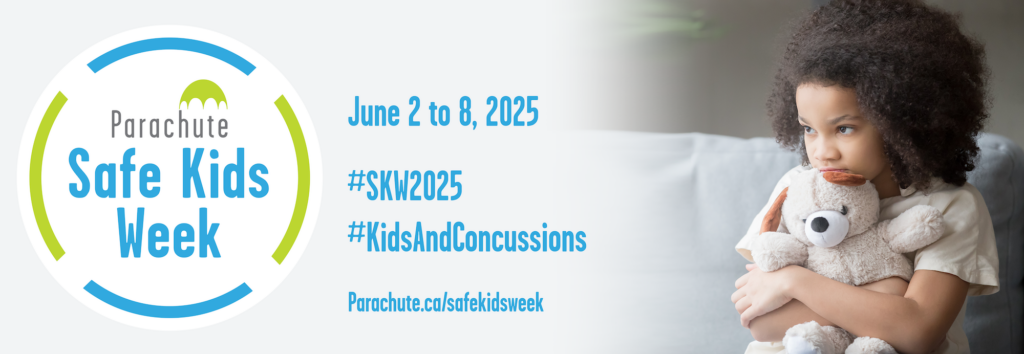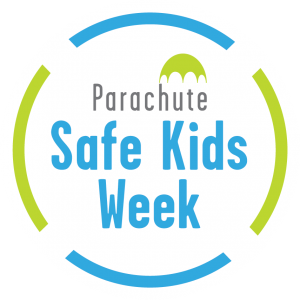
Parachute’s Safe Kids Week is an annual awareness campaign designed to bring attention to predictable and preventable injuries in children. This year, Parachute celebrates Safe Kids Week June 2 to June 8, 2025, with the theme of #KidsAndConcussions.
Primary Hashtag: #KidsAndConcussions
Secondary Hashtag: #SKW2025
Below are sample posts you can use on other social media channels (X, Facebook, Instagram, Bluesky, Mastodon). You are also welcome and encouraged to come up with your own tweets and messages that make sense for your organization and your community.
Please note that X posts can only be 280 characters in length (including links). We also encourage you to download and add these Safe Kids Week 2025 Social Media Images to your posts, to catch your readers’ eye.
Sample posts to use before the start of Safe Kids Week:
- Save the date! Safe Kids Week runs June 2-8, 2025. This year’s focus: kids and #concussions. Join us to help keep children safe! parachute.ca/safekidsweek #SKW2025 #KidsAndConcussions
- Save the date: June 2 – 8, 2025 is #SKW2025! We’re raising awareness and sharing information about concussions and children – from toddlers to teens. Be part of it. parachute.ca/safekidsweek #KidsAndConcussions
Sample posts to use during Safe Kids Week (June 2 to June 8, 2025):
- Concussions can happen at any age – even without a direct hit to the head. Learn more about #KidsAndConcussions this #SKW2025: parachute.ca/safekidsweek
- Did you know? 71% of concussions in children under 5 are caused by falls – often from beds, stairs, or sofas. Learn more about preventing falls and concussions at home: parachute.ca/safekidsweek #SKW2025 #KidsAndConcussions
- As kids grow, the main causes of concussion change:
Under 5: Falls.
Ages 5-9: Falls & sports.
Ages 10-14: Sports & recreation.
Learn more: parachute.ca/safekidsweek #SKW2025 #KidsAndConcussions - Preventing falls can prevent concussions in young kids. Here are some tips for preventing falls at home: use safety gates at the top and bottom of stairs; install window guards; avoid baby walkers with wheels. Learn more during #SKW2025. parachute.ca/safekidsweek #KidsAndConcussions
- Concussions aren’t just from hits to the head. A hard fall or body blow can cause the brain to move inside the skull. Know how to prevent, recognize and respond to concussions: parachute.ca/safekidsweek #SKW2025 #KidsAndConcussions
- Parents and caregivers: Learn how to prevent, recognize, and respond to concussions in kids. Join us for #SKW2025. parachute.ca/safekidsweek #KidsAndConcussions
- Calling all parents, caregivers, teachers, child care workers, family and friends: everyone has a role to play in preventing, recognizing and responding to concussions in kids. Join us for #SKW2025. parachute.ca/safekidsweek #KidsAndConcussions
- DYK: Signs of concussion in young children primarily show up as changes in behaviour? Use the Early Childhood Detection Tool to learn more about how to recognize concussion in young children: https://coco.umontreal.ca/en/coco-tools/ #SKW2025 #KidsAndConcussions
- Young children may not be able to express their symptoms after a head injury. Knowing what symptoms to look out for is key. Check out the Early Childhood Detection Tool to learn more: https://coco.umontreal.ca/en/coco-tools/ #SKW2025 #KidsAndConcussions
- Recovery from a concussion takes time. Rest and gradual return to activities are key. Learn more during #SKW2025. parachute.ca/safekidsweek #KidsAndConcussions
- This #SKW2025 we’re focusing on #KidsAndConcussions. A concussion is not just a bump or a bruise: it is a brain injury. Just like older children and adults, young children can experience concussion symptoms. Learn more: parachute.ca/safekidsweek
- Care for #KidsAndConcussions should follow Canada’s Living Guideline for Pediatric Concussion. Learn more: https://pedsconcussion.com #SKW2025
- Myth: Helmets prevent #concussions.
Fact: Helmets prevent many serious head injuries, but not concussions. Stay informed this #SKW2025. parachute.ca/safekidsweek #KidsAndConcussions - Myth: A child must lose consciousness to have a concussion.
Fact: Most concussions happen without a loss of consciousness. Know the signs. parachute.ca/safekidsweek #SKW2025 #KidsAndConcussions - Myth: If a child looks fine after a fall, there’s nothing to worry about.
Fact: Symptoms of a concussion can show up hours or days later. Stay alert. parachute.ca/safekidsweek #SKW2025 #KidsAndConcussions - Myth: A child with concussion should rest and do no activities until their symptoms are gone
Fact: Getting back to activities, in the right way, helps children and their brains heal. parachute.ca/safekidsweek #SKW2025 #KidsAndConcussions
If you have any questions or need some guidance, please feel free to contact Parachute’s social media team at socialmedia@parachute.ca.
